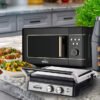Refrigerator Troubleshooting: How To Fix A Fridge
A working refrigerator is one of the basic needs of modern households, as it saves a lot of your time and money by keeping your food safe and fresh. A fridge that is not working properly can be a reason for a huge mess in our daily lives.
In this article, we are going to discuss the most common refrigerator problems and tips and tricks to solve these problems at home.
Why Is My Refrigerator Cycling Too Often?
- Dirty condenser coils can reduce heat dissipation and cause the compressor to run more often to maintain the temperature. Gently clean the coils by using a brush or vacuum for improved working. Clean the coils after every 6 to 12 months.
- If the temperature is set too low, then it may cause the fridge to turn off and on again and again. Make sure to set the temperature to 37–40°F (3–4°C) for the fridge and 0°F (-18°C) for the freezer.
- A faulty temperature sensor, defrost timer, or control board can also be causing the same issue. Check them all by using a multimeter and fix or replace the faulty device.
- An empty or overloaded fridge can also be a main cause for a refrigerator cycling too often.
How To Remove A Thick Ice Sheet From The Freezer Floor?
A thick layer of ice usually builds up at the freezer floor when the drain is blocked; the defrosted water freezes at the bottom.
Turn off the fridge and remove all the food items. You can use warm water or a hair dryer to melt the ice; never use sharp objects to break the ice. Gently scrape with a plastic spatula.
Check the defrost drain by pouring warm water through it using a syringe or pipe. If the water doesn’t drain, then the pipe is blocked or frozen.
A faulty defrost timer, temperature sensor, or control board can also stop the defrost cycle and cause water to freeze at the bottom. Test them using a multimeter and replace the defective part.
How To Troubleshoot Excessive Cooling In A Refrigerator?
- If your fridge is freezing everything, check if the thermostat is set too low. Keep the fridge at 37–40°F and the freezer at 0°F.
- A faulty temperature sensor or control board can also cause overcooling. Use a multimeter to test the sensor resistance.
- Check the air damper between fridge and freezer compartments. If it’s stuck open, too much cold air will enter the fridge section, causing excessive cooling inside the refrigerator.
- Make sure items are not blocking the air vents. Poor airflow can confuse the sensor and lead to excess cooling.
What To Do When Your Fridge Is Not Cooling?
- Dirty condenser coils can reduce heat dissipation and force the compressor to work harder. Clean the coils using a brush or vacuum every 6 to 12 months.
- Check if the temperature setting is correct. Set it to 37–40°F (3–4°C) for the fridge and 0°F (-18°C) for the freezer.
- Check the evaporator fan, condenser fan, and compressor. If one of them is not working, the fridge won’t cool properly. Use a multimeter to test the components.
- A damaged door seal can also allow warm air in. Make sure the door closes tightly.
What To Do When Your Fridge Is Making Too Much Noise?
Loud buzzing or knocking sounds may indicate a faulty evaporator fan, condenser fan, or compressor.
Check if the noise is coming from the back or inside the freezer. Ice buildup around the fan blade can cause a continuous noise. Turn off the fridge and defrost it manually if needed.
Check the fan motor and check for any loose parts. If the fan blade is broken or the motor is noisy, replace it.
What To Do When There Is A Leakage Of Water?
A cracked or displaced drain pan can be a possible reason for water leakage. Check under the fridge for water collecting in the tray. If the pan is damaged, replace it.
If your fridge has a water dispenser or ice maker, check the water inlet line. A loose connection or cracked hose may cause leaks.
Do You Need A Professional?
If the fridge is not working as desired even after cleaning the coils, adjusting settings, and checking the components, then it’s time to call a technician.
Problems like a failed compressor, control board, or sealed system leak usually require expert help and professional tools. Don’t try to repair high-voltage or sealed parts without training.
When To Buy A New Refrigerator?
If your fridge is more than 10–12 years old and needs frequent repairs, then replacement is a better option.
Consider a new model if:
- The compressor has failed.
- It consumes too much electricity.
- Cooling is inconsistent.
- Parts are hard to find or too expensive.
New inverter refrigerators are energy-efficient and provide stable cooling with fewer issues.
Conclusion
Your refrigerator is a vital appliance in your home, and even minor issues can disrupt your daily routine. From ice buildup in the freezer and water leaks to excessive cooling or unusual noises, most problems can be resolved with simple maintenance and basic tools.
At Generaltec, we recommend regular cleaning, accurate temperature settings, and routine inspections of components like the defrost drain, fans, and sensors. Tools like a multimeter can help you identify faulty parts early, allowing for quick replacements.
However, if the problem persists or your fridge is aging and inefficient, it’s time to call in a professional—or consider upgrading to a new, energy-efficient model. Timely action not only protects your food and reduces energy bills but also ensures long-term peace of mind.
Generaltec – Reliable Cooling Starts Here.
FAQs
Why Does A Thick Ice Sheet Form On The Freezer Floor?
It usually forms due to a clogged or frozen defrost drain. When melted ice from the defrost cycle can’t drain, it pools and refreezes at the bottom.
How Do I Safely Remove Ice From The Freezer Floor?
Unplug the fridge, remove food, and melt the ice using warm water or a hair dryer. Never use sharp tools. Gently remove softened ice with a plastic spatula.
What Should I Do If My Fridge Is Not Cooling Properly?
Clean the condenser coils, check the thermostat settings, inspect the door seal, and test the evaporator fan and compressor using a multimeter.
Can Dirty Coils Affect Fridge Performance?
Yes. Dusty coils reduce heat dissipation and cause the compressor to overwork. Clean them every 6 to 12 months with a vacuum or brush.
Why Is My Fridge Making Unusual Noises?
Loud noises could mean a faulty fan motor, ice buildup, or a loose part. Check the evaporator and condenser fans for any obstruction or damage.
How Do I Fix Water Leaking From The Refrigerator?
The most common reason is a blocked defrost drain. Flush it with warm water. Also, check for a cracked drain pan or a leaky water line.
What Causes Excessive Cooling Or Freezing In The Fridge Section?
It can be due to a low temperature setting, a faulty temperature sensor, or a stuck air damper letting too much cold air into the fridge compartment.
How Often Should I Check And Clean My Refrigerator Parts?
Check the coils, seals and drain every few months. Clean coils every 6 to 12 months and inspect for any abnormal sounds, leaks, or temperature changes.
When Should I Call A Professional Technician?
Call an expert if the compressor, control board, or sealed system is faulty, or if the fridge is still not cooling after basic troubleshooting.
When Is It Time To Replace An Old Refrigerator?
If the fridge is over 10 years old, has frequent problems, or uses too much electricity, it’s more cost-effective to buy a new inverter model with better energy efficiency.














Add comment